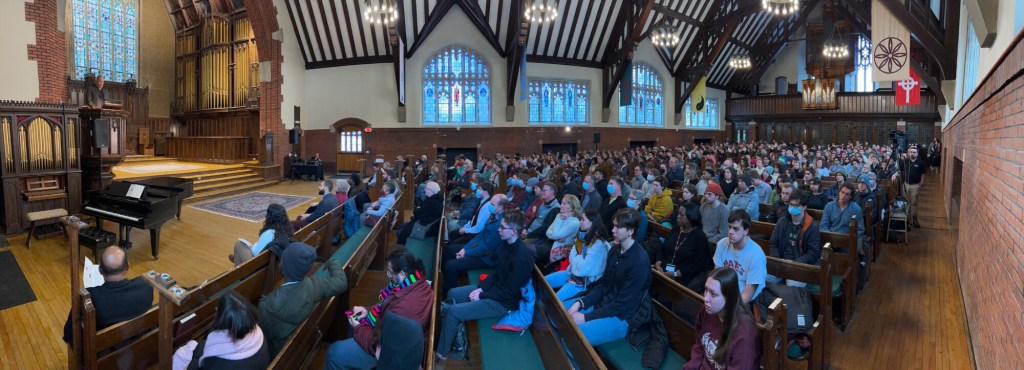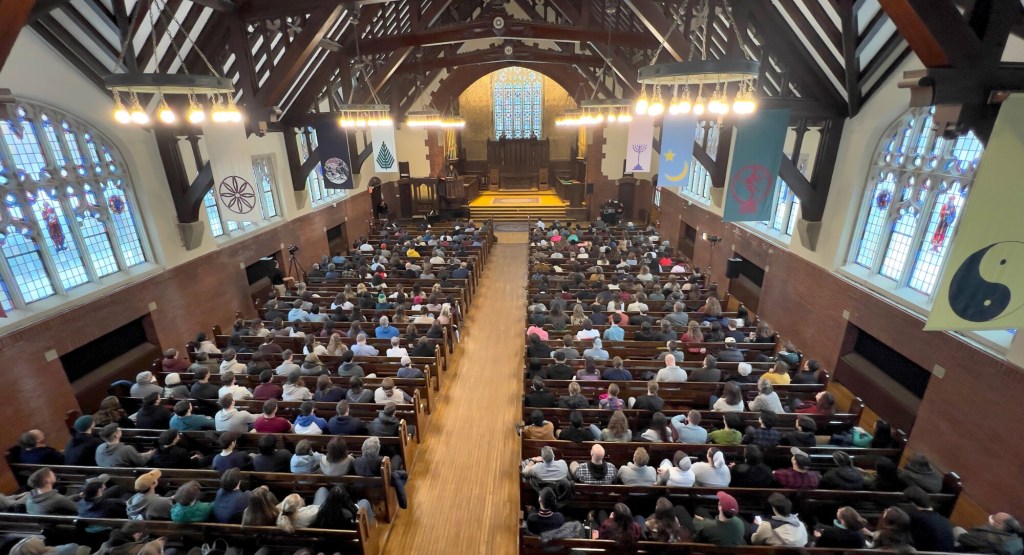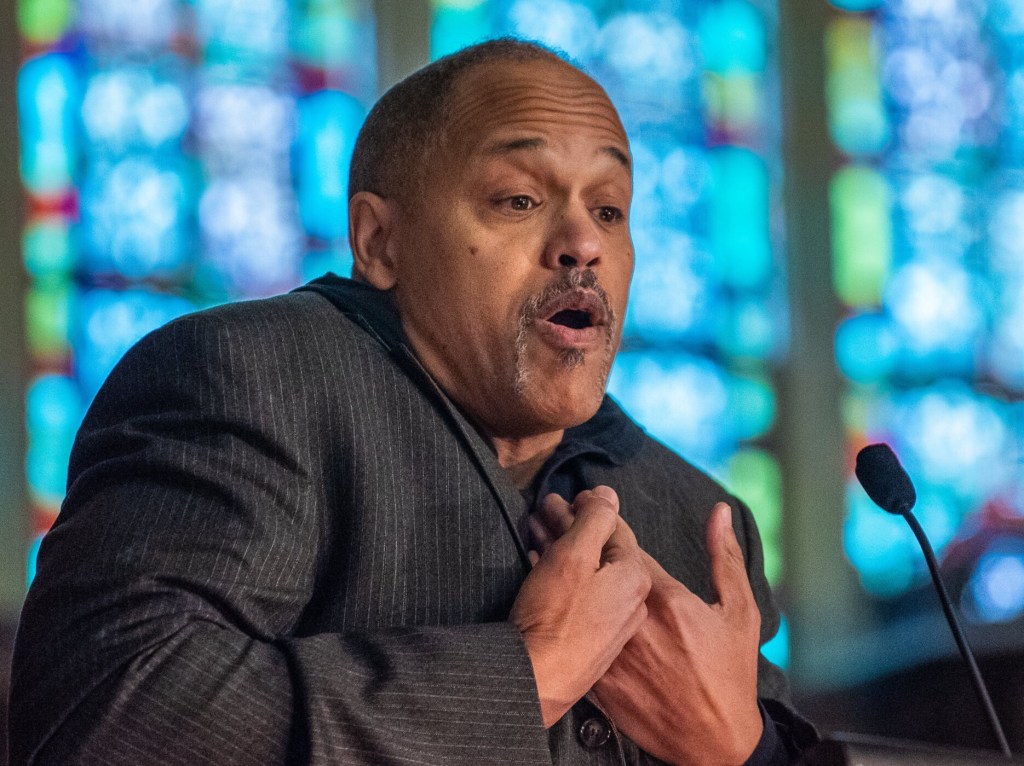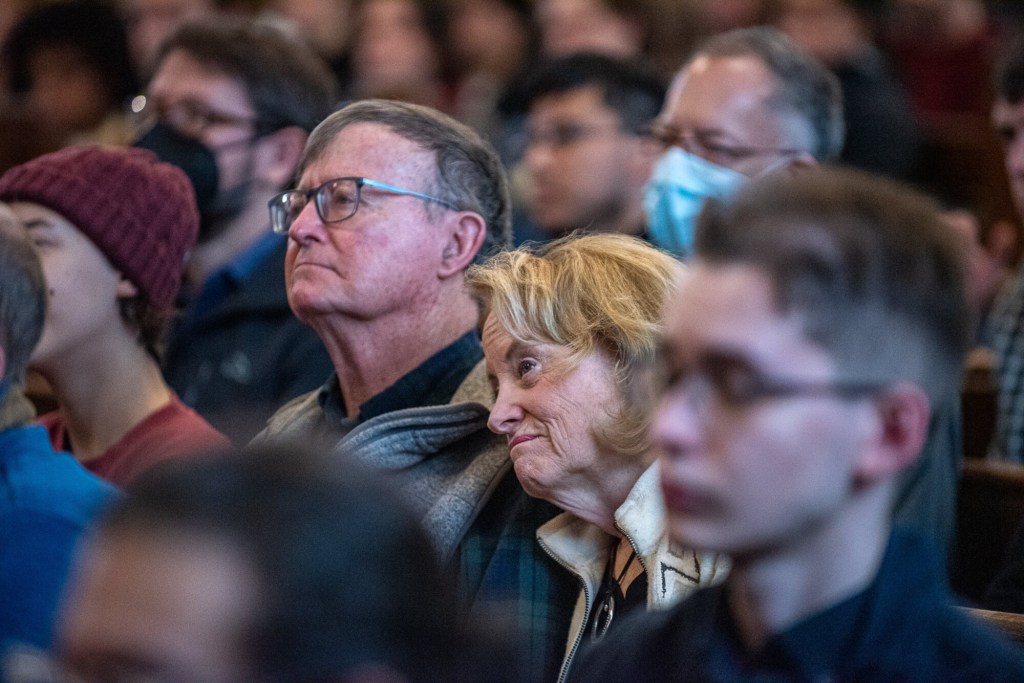LEWISTON — Keith Hamilton Cobb, an actor and playwright, shared an evocative, rousing call to action Monday for an audience of hundreds in the Gomes Chapel to kickoff the college’s first in-person Martin Luther King Jr. Day since 2020.
Best known for his roles in TV shows such as “All my Children” and “Gene Roddenberry’s Andromeda,” Cobb also received acclaim for writing “American Moor,” an off-Broadway play that examines race, Shakespeare and America.

Actor and playwright Keith Hamilton Cobb delivers the keynote speech Monday morning at Peter J. Gomes Chapel at Bates College in Lewiston. It was one of many Martin Luther King Jr. Day events. Russ Dillingham/Sun Journal
“I don’t suggest that any particular brand of activism is your job, or that if it is, it needs to be huge or sensational or internet worthy,” Cobb said. “Rosa Parks simply said yes to saying no. And nothing was ever the same again.
This is simply to say, should it one day dawn on you that it is your job? As inconvenient as it may be, you say yes.”
Activism, by its nature, is self-sacrificial, he said, noting that it can take many forms, both familiar and personal. Even “being wholly unapologetically who you are,” is a form of activism, he said.
But too many people have lived their lives avoiding discomfort, rather than embrace the life’s purpose that is revealed to them, he later said. “Your radical yes need not be of the immensity of Martin Luther King’s.”
He likened the world’s current state to purgatory.
“Neither heaven nor hell, it is designed to be just comfortable enough for you to forget that you don’t like it,” Cobb said. “That is its very definition and its inherent danger. Here is where our exceptional societies go to die.”
He challenged those in attendance not to “perpetuate sameness,” but to create change.

Bates College President Clayton Spencer, right, and Sam Jean-Francois, Class of 2023, listen to speakers Monday morning during Martin Luther King Jr. Day at Peter J. Gomes Chapel. Russ Dillingham/Sun Journal
“Nothing but more of what this is that we’re living already comes of your silence, your complacence, your doubting of your own intellectual agency, your stifled creativity,” he said.
“All men and women and the nonbinary are not created equal,” Cobb said. “It’s nonsense. What we are is equally human.”
The theme for Bates’ MLK Day celebration this year was Art & Activism, the intersection of creation and change.
Assistant Professor of Environmental Studies Tyler Harper explained that it was an essay about civil disobedience written by poet and political activist Henry David Thoreau, which provided early inspiration for King, not a sociologist or political scientist as some might guess.
“As Dr. King would later account, ‘Here, in this courageous New Englander’s refusal to pay his taxes and his choice of jail rather than support a war that would spread slavery’s territory into Mexico, I made my first contact with the theory of nonviolent resistance,” Harper recited.
While Shakespeare may be little use in the operating room and reading Octavia Butler cannot teach us how to build a suspension bridge, Harper said that King “recognized the transformative power of art and activism, and of art as activism.”
“Black activism has reshaped our ability to love, listen and care for one another in restorative ways,” said Sam Jean-Francois, Bates Class of 2023. “Complacency is a technology of white supremacy. It teaches us that racialization, exploitation and globalized anti-Blackness are natural parts of life, rather than the disrupters that they truly are.”
Beyond the keynote address, Cobb also led a viewing and discussion of his celebrated play, “American Moor,” and facilitated a discussion about the legacy and racial politics of Shakespeare’s infamous play, “Othello.”
“Speak your whole truth with all your voice,” Cobb implored. “Emerge from the wilderness and deliver your epistles irrespective of who is ready to hear them. You are the bringer of light and change, not the jackass whisperer.”
Send questions/comments to the editors.











Comments are no longer available on this story